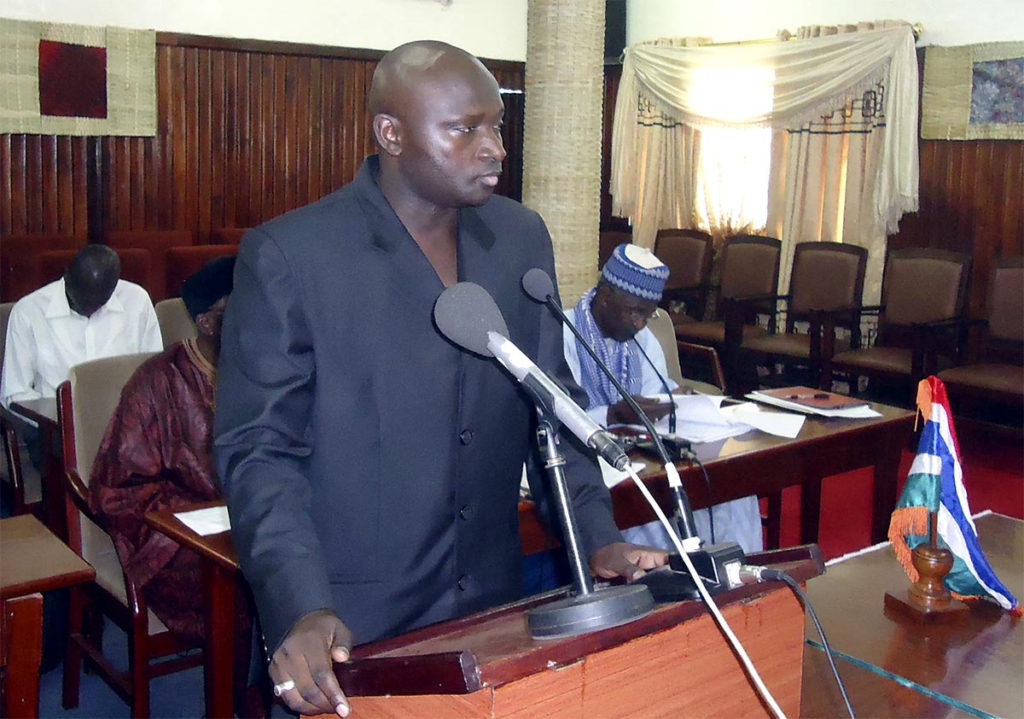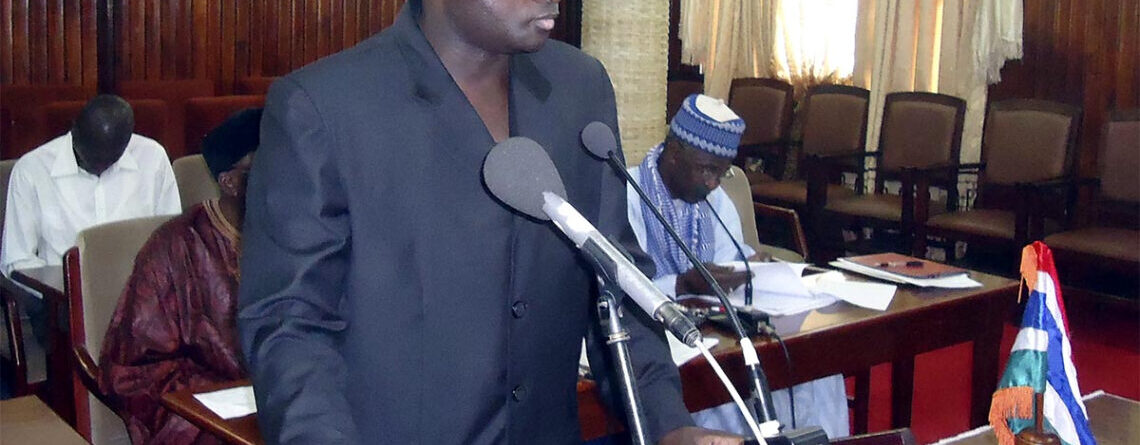After 5 years in detention, no end in sight but Swiss authorities are determined to break the Ousman Sonko case

On January 26, 2017— exactly five years ago—a former Gambian Interior Minister Ousman Sonko was arrested in Switzerland. Sonko—Jammeh’s longest serving interior minister suspected of crimes against humanity, has since been in pre-trial detention as authorities in the European country probes his alleged rights violations.
“We are in close collaboration with the Swiss Prosecutors who visit Gambia frequently to obtain evidence from various witnesses,” said state lawyer Fatou L. Njie who participates in facilitating such trips.
“The Ministry of Justice facilitates the work of the Swiss Prosecutors by hosting them in our offices anytime they visit Gambia, we also contact and arrange appointments with the prospective witnesses and facilitate witness transportations where necessary.”
Yahya Jammeh— living in exile in Equatorial Guinea since 2017—has rule the small country with an iron fist. He stands accused on several human rights violations including murder of political opponents, journalists and rape. For several years, including for a decade as a minister—from 2006 to 2016— Sonko serves at his pleasure.
Late July 2014, barely two years before they fall out, Jammeh claimed on national television “dekabi ma ko mom” – “I own this country”, in the Wolof language. This was in a meeting with members of the Supreme Islamic Council, Jammeh’s religious leaders who were in conflict with some of Gambia’s traditional scholars. The dispute was over which day Muslims were to observe Eid al-Fitr, a Muslim festivity after Ramadan. Jammeh said anyone who did not observe Eid al-Fitr on the date chosen by the Supreme Islamic Council and prayed on another day would be arrested.
Present at the meeting was Interior Minister Ousman Sonko. In a typical, emotional outburst, Jammeh threatened Sonko that he would visit his “hotel”, referring to Mile 2 Central Prison located at the outskirt of Banjul, if he did not arrest anyone who prayed on a day not endorsed by him.
Following the meeting, several individuals were arrested, including a prominent Gambian scholar, Sheikh Sheriff Muhideen Hydara. That case would later collapse due to lack of evidence.
Shortly before Jammeh fell out with Sonko, some members of the opposition United Democratic Party were arrested at Westfield. They were reportedly brutalized, killing Ebrima Solo Sandeng. At least 2 women among the arrestees alleged to have been raped.
Arrest in Switzerland
In Switzerland, Sonko is accused of having had command responsibility in widespread abuses committed by agents and bodies under his control, including the police, National Intelligence Agency, notorious hit-squad called the “Junglers”, and prison services.
Sonko has been in jail ever since. His case was brought on a complaint from Geneva-based NGO TRIAL International, initially for torture, which was then requalified as crimes against humanity.
Sonko’s lawyer told justice Info keeping him in pre-trial detention in Switzerland for five years while the Office of the Attorney General continues to investigate is an abuse of his rights and a travesty of justice.
“I can understand that in a universal jurisdiction case against a former minister from a third country, it could be considered that there could be a risk of evasion or interfering with the process. But that does not mean you can dispense with his rights,” Sonko’s lawyer Philippe Currat told Justice Info.
“He has been in preventive detention for five years without being informed of any precise charge. They say crime against humanity, but without any precision nor individualisation.”
Switzerland has a new Attorney General who took office on January 1 and might give more priority to prosecuting international crimes.
TRRC indicts Sonko
Little information about Swiss investigations into Sonko’s case is public. The sites their investigators visit or witnesses they speak to are closely guarded secrets.
However, Sonko faces several indictments, according to the findings of the country’s Truth Commission. The former minister faces allegations of rape, charges brought by Binta Jamba a former police officer and wife of ex Lt. Almamo Manneh.
Manneh was reportedly killed by Sonko and a team of junglers who were ordered by Jammeh to arrest him and his colleague Sgt. Momodou Dumbuya. Lalo Jaiteh, a former close protection officer to Jammeh who claimed to have been privy to circumstances around the murder of Almamo Manneh, said Sonko and his colleagues murdered him.
The Truth Commission found Sonko as an “enabler and accomplices” in the “arrest, enforced disappearance, and extrajudicial execution in the Gambia of over 67 unarmed West African economic migrants who the Jammeh regime perceived as mercenaries”. According to the Commission’s findings, he also participated in the official coverup of the violation that sought to exonerate Gambia government of the murder of the migrants.
Sonko is also implicated in the planning and execution of the unlawful killing of 9 deathrow inmates in Gambia in August 2012.
“On arrival at the shooting range, the bodies were confirmed dead in the presence of the two ministers Lamin Babadinding Jobarteh (former justice minister) and Ousman Sonko,” said the Commission.
Sonko is also indicted for the attempted assassination of lawyer Ousman Sillah
Sillah, a lawyer to Baba Jobe—a one-time ally of Jammeh who was facing economic crimes charges—was shot in multiple times in December 2003. Sillah was taken to a nearby hospital and later evacuated to Senegal for further treatment. Jammeh would later used junglers to kill Baba Jobe on a hospital bed while he was serving his prison time on economic crimes charges at Mile 2.
“Yahya Jammeh procured Ousman Sonko, Tumbul Tamba, Sulayman Badije, Bai Lowe and others to assassinate Lawyer Ousman Sillah. All of them are responsible for the attempted murder of Lawyer Ousman Sillah,” the Truth Commission concluded.
“The recent TRRC accusations bring into light the crucial role played by Ousman Sonko within Yahya Jammeh’s regime and reinforce the case currently being investigated in Switzerland. After five years of investigations and more than a decade after some facts, the victims are more than ever in need for justice,”said Benoît Meystre, the legal advisor at TRIAL International.
The walls collapsing around Jammeh?
In Gambia, the debate over how to handle Jammeh-era crimes is edging towards a hybrid court system. With death penalty in the country’s statute books and no recommendation from the TRRC to banning it, the small country could find it difficult to have its extradition requests to most countries accepted.
Sonko’s case is a powerful symbol of the use of universal jurisdiction to deal with Jammeh-era crimes. With Bai Lowe in Germany and Michael Sang Correa in America, successful prosecution of Sonko, for crimes that were committed with tacit approval of Jammeh, could be seen as a successful indictment of his regime’s crimes.
For Reed Brody, a prominent internatonal lawyer working with Jammeh’s victims, the wall that seal Jammeh might just be collapsing.
“These arrests show that the long arm of the law is catching up to Yahya Jammeh and his accomplices around the world. Jammeh’s henchmen have been arrested in Germany, Switzerland and the United States, and now the Gambian truth commission has called for the prosecution of his accomplices in The Gambia, and of Jammeh himself. These international arrests and the approaching trials will set the pace. They demonstrate to Gambians that justice is possible when the political will exists, and an expectation that what is happening abroad to underlings can happen at home to Jammeh himself,” said Brody.
“The Sonko trial, and the upcoming trials in the United States and probably Germany will test the evidence of the regime’s crimes in the crucible of courtrooms in three countries. They will establish that crimes were committed by people who worked under Jammeh and, in the case of Sonko, who allegedly took orders from Jammeh himself. It will still of course be necessary to link the crimes to Jammeh in order to show his responsibility, but the “crime base,” as lawyers say, will have been proven.”

